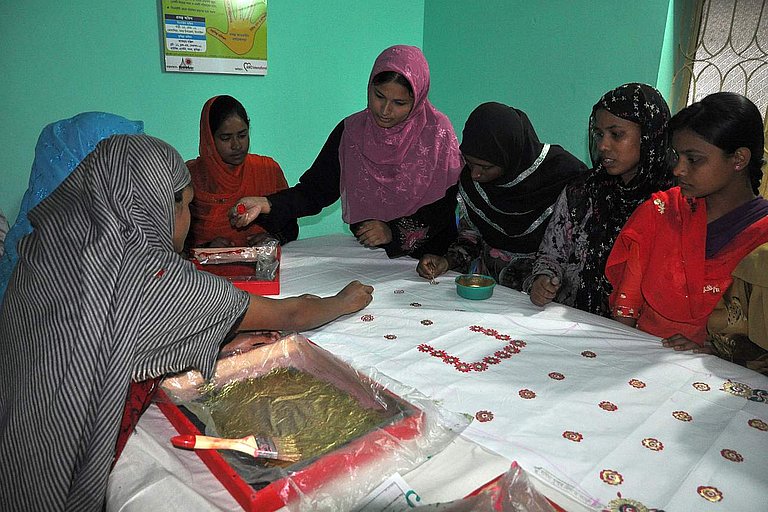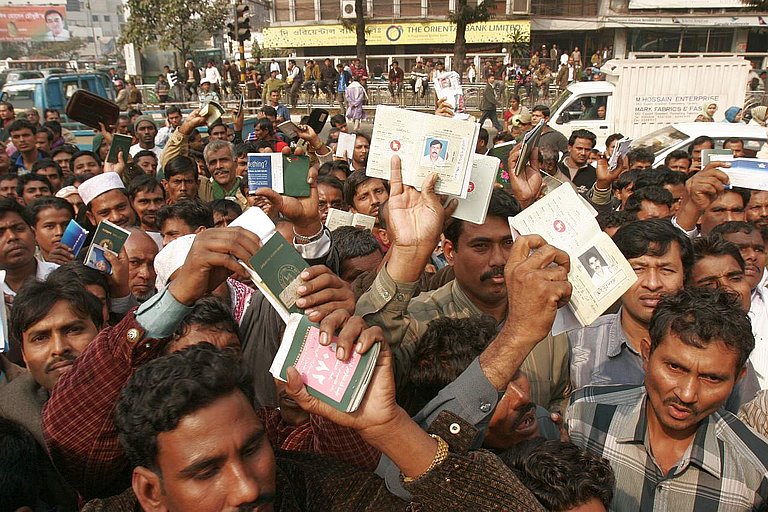For many people in Bangladesh, migration has become a survival strategy - in a country that has made a lot of progress but is still one of the poorest in the world. Migration seems to be a way out to achieve some prosperity. The remittances of migrants are of central importance for the economy in Bangladesh. With 15 billion US dollars in 2015, they are the third largest source of foreign exchange after the textile industry and agriculture. Most migrants go abroad as unskilled workers. While a few years ago it was primarily men who left the country, about 20 percent of the migrants are now women. About 80 percent migrate to Arab countries, another 15 percent to South and Southeast Asia.
The exploitation of many migrants often begins even before their departure: Many are recruited by dubious middlemen who demand horrendous sums for their "services". The people get into debt and become dependent. The situation of migrant workers in the destination countries is often catastrophic; they are exploited, do not receive the agreed wages, work under inhumane and dangerous conditions. In addition, in many countries they are de facto without rights. In Qatar, for example, where the Kafala system prevails, migrants need an employer in the country to vouch for them and without whose permission they are not allowed to leave the country or seek other work. They are at the mercy of the employer and enter into a kind of debt bondage.
Information and advice for labour migrants

To improve the situation of migrant workers, we have been working with our partner WARBE Development Foundation in Bangladesh since 2012. WARBE was founded by returning Bangladeshi migrant workers and has since become one of the central actors in the country's migration policy.
As part of the joint project, three Migration Information Centres were opened in the particularly affected districts of Comilla, Tangail and Chittagong. Here, potential migrants, returnees and family members receive information and advice on all relevant issues concerning safe migration. In addition, WARBE offers training bettering the preparation of potential migrants for their departure, as well as three-month training courses to improve the participants' skills so that they can find qualified jobs.
In addition to its educational and information work, WARBE also acts as a mouthpiece for migrants vis-à-vis government institutions, lobbying and advocacy. At national level, state actors must be held more accountable to improve the situation of migrants.
Projectinfo
| Project | Safe migration in Bangladesh |
|---|---|
| Place/Region | Project activities throughout Bangladesh, lobby and advocacy work in Dhaka |
| Partner | WARBE (Welfare Association for the Rights of Bangladeshi Emigrants ) |
| Target group | Migrants, potential migrants and returning migrants, relatives |
| Activities |
|
| Duration | 2017-2019 |
| Budget | 35.000 Euro p.a. |
| Sponsor | BMZ |

![[Translate to Englisch:] Eine Mitarbeiterin und Partizipierende bei einem Workshop für die Herstellung von Hygieneprodukten (Foto: Carlos Cano/ AWO International) [Translate to Englisch:] Eine Mitarbeiterin und Partizipierende bei einem Workshop für die Herstellung von Hygieneprodukten (Foto: Carlos Cano/ AWO International)](/fileadmin/_processed_/6/3/csm_Carlos_Cano_x_ACCSS_1_1280x800_b24e28b01c.jpg)
![[Translate to Englisch:] Die Crew der Ocean Viking bei einem Rettungseinsatz im Mittelmeer (Foto: Laurence Bondard/SOS MEDITERRANEE) [Translate to Englisch:] Die Crew der Ocean Viking bei einem Rettungseinsatz im Mittelmeer (Foto: Laurence Bondard/SOS MEDITERRANEE)](/fileadmin/_processed_/a/8/csm_SOS_MED_Laurence_Bondard_SOS_MEDITERRANEE_first_rescue_17a5c33218.png)